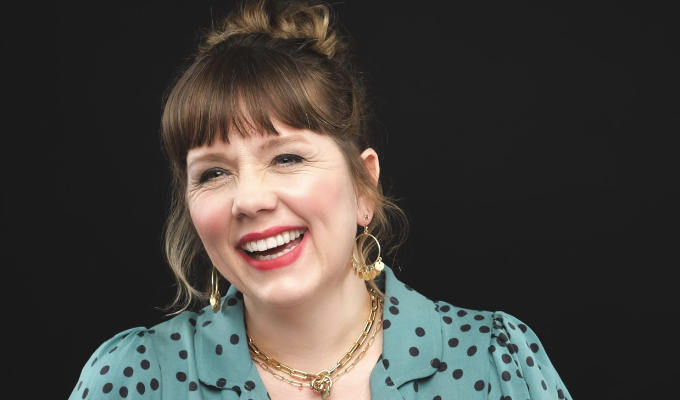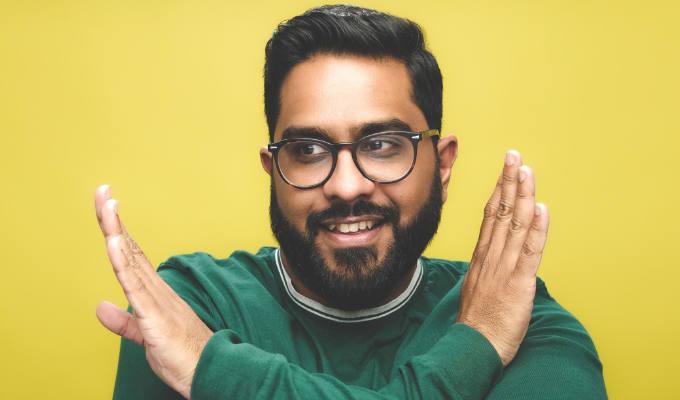Paul and Angela hit the jackpot
BBC1's new comedy, Eyes Down
The worlds of medicine and comedy have long been linked. Not just in the 'doctoLily Savage creator Paul O'Grady makes his sitcom debut next month, playing misanthropic bingo hall manager Ray in the new BBC1 series Eyes Down.It was written by newcomer Angela Clarke, who landed the commission through a BBC scheme to develop new writing talent. Not that she's any stranger to showbiz, being an actress as well as the sister of fellow thespian Margi and of screenwriter Frank.
O'Grady thinks he'ss taken to his first sitcom like two little ducks to water.
"I was sent a script and fancied it because it was a big change for me," he says. "The stuff I get sent is always the same - I'm either the hard-bitten drag queen in the bar who says, 'Take it from me, kid, life's tough', or some dreadful old tranny.
"Ray hates humanity, pensioners in particular - but when you look at what he's got to deal with, you're not surprised he's wicked and snide. He's a deeply frustrated man.
"It's a challenge and it's also getting away from Lily. I'm so sick of putting all that gear on - it's stifling.
Paul's transformation from a 47-year-old man into the acid-tongued, peroxide blonde takes about an hour.
"That's costume, nails and gluing wigs on. This job's lovely. I ruffle my hair and that's it, I'm finished. Also, I'm not arriving with bags and bin liners like a travelling circus"
Not that the Birkenhead-born comic is retiting his most famous creation.
"I'm doing her again at Christmas," he said. "I quite like doing her every now and then because you have a laugh. There's a lot of things she does I'd like to do but never could, I haven't got the bottle.
"I've done stuff as myself, but I always hold back, although I'm getting better. I used to be very reserved because I didn't have a telly persona as myself. And then I thought, just be yourself. If they don't like it, bugger them!"
Paul has turned his life around since his near-fatal heart attack in April last year - quitting cigarettes for a while and buying a Kent farmhouse from comedian Vic Reeves.
"I'm better than ever," he says, "although I went back on the ciggies when I was learning to drive which has annoyed me, because I gave up for 10 months. But as soon as filming Eyes Down finishes, I'm coming off them.
"I hate them. I wish they'd charge 60 quid for a packet or ban them completely. I'm so annoyed, because it's the one monkey on my back I haven't shaken off."
He's also drastically reduced his alcohol consumption.
"I'll have the odd one, but not very often. I used to go out every night of the week but I can't be bothered. When I had the heart attack I grew up overnight.
"In this game you work hard and you play hard. You're burning the candle at both ends - you're not getting any sleep, you're drinking far too much and you're not eating properly.
"I was really miserable before I had the heart attack. I wasn't well and I was permanently tired. But I'm now quite happy with what I've got."
Another performer happy with their lot on Eyes Down is its Liverpudlian creator, Angela Clarke, who only began her writing career two years ago when she sent a handwritten script to the BBC's new writing scheme.
The career change came after she gave birth to her son, after years as an actress.
"When you've a newborn baby, you're stuck at home, which is fantastic, yet you have so much time on your hands," she said.
"While the baby was napping I used to scribble ideas down to keep myself amused - it was more of a hobby than anything else. I didn't know where I was going to go with it."
The she heard about the BBC scheme, which was looking for women comedy writers.
There were 250 applicants, and Angela was awarded one of the final ten places. From that, the eight-part BBC1 series, which airs from August 15, evolved.
"I thought the script I had was dark and dramatic," she says, "but everyone else found it hilariously funny.
"Nothing changes in a bingo hall. The same people go there, they sit in the same seats, and they don't like anything to change - it's almost like a religious routine.
"Although, that's the one thing they go for - to change their life forever. And I liked that paradox.
"I knew I had struck gold. I didn't labour over it at all. It just came to me really quickly. I had the first episode written in two and a half weeks. It was like popping a champagne cork."
Then all she had to do is wait to see what the BBC thought.
"I got a call saying that the script had been shown to the head of comedy, and she had really liked it," she said. "So I wrote another episode and then we did a read-through.
"Lorraine Heggessey, the controller of BBC1, came to see it and she called back to say she loved it and they wanted to commission a series.
"So from the workshop in September, it was commissioned in February."
Angela had also developed some rather unorthodox writing techniques.
"I did some of the writing at home, but there was so much going on. I prefer to write in Kirkby Library, I liked it for the discipline."
Angela - who cites Victoria Wood, Alan Bennett and David Renwick as her comedy idols - says Eyes Down is a traditional comedy, but one close to the bone.
"I haven't tried to water it down," she says. "I wanted to stay true to the characters, so maybe some people will be shocked, but I haven't tried to be crude, I've just been honest.
"Anything that is shocking comes from Mary's lips, which I think is more palatable because she's an old woman."
Among the other characters is Pamela, a wheelchair-bound sex kitten.
"I didn't approach it from a politically correct point of view. I just thought up a character who happened to be in a wheelchair.
"And although she's a wheelchair user, she is very in control of who she gets and what she wants and what she does. She isn't a victim in any way."
So now that Angela has Eyes Down under her belt, is she thinking about a permanent career change?
"I always knew I was in the right business, but I didn't know whether I was in the right vein of the business," she says. "Now I feel as though I'm really doing what I've always wanted and needed to do. "
First published:July 23. 2003r, doctor' joke or the tedious parade of scatological and gynecological gags that make up your average medics' revue, but in an impressive list of performers who have made the jump from med school to comedy, thats include the likes of Graham Chapman, Jonathan Miller and Harry Hill.
More recently, Phil Hammond, a former GP and sexual health specialist, has joined their ranks - but, unusually, he's carving a niche out for himself by actually using his medical knowledge in his act.
And now, this stand-up, writer and broadcaster, can add 'actor' to his diverse CV, after taking a small role in Doctors And Nurses, the new BBC ONE sitcom he co-writote.
"I got the part because we wanted an arrogant, posh idiot and, for some reason, I seemed to fit the bill," he says.
"I was also very cheap and it was only for one scene so I'd need to be really bad to ruin it. From a writer's perspective, I wanted the insight of rehearsing with the cast and feeling the pressure on recording day."
Phil is used to being on stage in front of an audience, having completed his first solo stand-up tour,89 Minutes To Save The NHS, last year, but TV is a different beast.
"It was much harder than being on stage," he says. "There are lots of tricks to screen acting, like cheating your eye-line so you get more of your face in shot, and keeping movements to a minimum as they are greatly exaggerated.
"Unfortunately, no one told me this until afterwards, so all you get is my ugly profile thrashing about like a grounded mackerel. But at least I didn't upstage the star."
Phil was invited to co-write Doctors And Nurses by Nigel Smith, a writer new to TV - aside from contributing sketches to the short-lived TV To Go.
Nigel had the idea for the sitcom but soon realised he had a problem. "It soon became apparent that I ran a terrible risk of making a complete fool of myself if I got the details of the working practices of a hospital wrong," he says.
"The choice was simple: either spend years learning one end of a catheter from another or ask someone else to help with that and stick to writing jokes. Ten seconds later, I rang the country's foremost medical humorist to ask him to join me. Unfortunately, he wasn't available so I asked Phil."
Phil was quick to agree. "The sitcom offered the chance to bring to life issues I care passionately about in a fictional hospital with fictional characters; much safer than investigative journalism and a lot more constructive, too."
But Writing Doctors And Nurses didn't come easy. "Nigel encouraged me to keep writing sketch comedy and stand-up, and we developed a Radio 4 series, 28 Minutes To Save The NHS. I subsequently took it as one-man show to Edinburgh, and on a 60-date UK tour. The tour gave me a much clearer idea about what material would work best with a public audience, but sitcom is much harder to master than stand-up and my first attempts floundered.
"Writing a sitcom requires you to go over and over it until you get it as good as it can possibly be it's a bit like starting with a heart transplant, then changing your mind, doing bowel surgery, whipping out the gall-bladder, putting it back in again and then deciding you've got the wrong patient and starting again on someone else."
Doctors And Nurses centres on the dependent relationship between two surgeons on the Isle of Wight: the idealistic Dr Roy Glover, played by Adrian Edmondson (whose Young Ones character Vyvyan was a medical student) and the talented, cynical and wealthy George Banatawala (Madhav Sharma).
"Theirs is a symbiotic love-hate relationship," says Phil. "Roy likes being a big fish in a small pool, and is too frightened to leave. George would love to, but no-one will have him."
"The characters are clearly defined and different, and above all, real. Doctors have never been gods and nurses aren't super-human machines.
"Much of the power of medicine comes from this cosy belief that doctors are shining knights with magic bullets who can save us all from prolonged suffering and premature death," says Phil: "True, we can do some great things, but often we just obscure the inevitability of death. So let's not expect too much of the NHS. The staff are human and all of us are fallible."
First published:January 12, 2004
Published: 22 Mar 2009






